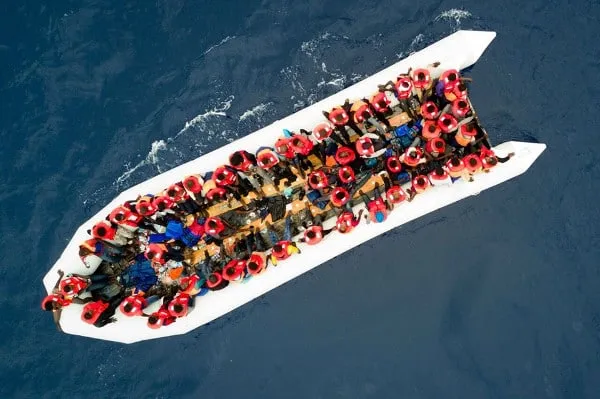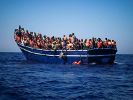Eye For Film >> Movies >> The Movement (2018) Film Review
The Movement
Reviewed by: Jennie Kermode

There are currently a record 25.4 million refugees in the world, most of them in the Middle East or northern Africa, many seeking sanctuary in Europe. These are people forcibly displaced from their homes, people fleeing war. Many have been tortured, raped or forced into slavery and know that they will face more of the same if forced to return. By the time they get into boats and risk their lives in the Mediterranean or Aegean sea, they have generally exhausted all other options. If this is something that distresses you, the chances are that you've tried to help by making a donation to an organisation like Care International. Sharon Walia took things one step further, taking a camera and microphone and setting out to document a side of the crisis rarely seen on our screens.
Walia's focus is not simply on the refugees themselves but on the ordinary people who have taken up position on the borders on Europe to try to help them. German charity Sea-Watch organises volunteers with boats to go out and fish people out of the water, provide first aid treatment and save as many lives as they can. Heather works for an organisation trying to keep refugees - especially those who are young and alone - out of the hands of pimps and traffickers. Dan provides football training sessions for teenagers who have survived the journey, something that might seem trivial but is important in restoring confidence and a sense of normality to individuals badly scarred by trauma.

Despite never having made a film before, Walia put this whole documentary together single-handed, and it's a highly impressive piece of work - notable not just for its subject matter but for its fluid composition and eye for detail. In making it, she placed herself in significant personal danger - as, indeed, many of the rescuers she spoke to do every day. Governments seek to impound rescue vessels and force refugees back into Libyan or Moroccan waters where they're somebody else's problem. Right-wing extremists target the rescuers. Traffickers are ready to kill anyone who gets in their way. There is big money to be made here. The lives of rescuers are comparatively cheap; refugees are worth a lot less.
The abuses detailed in Walia's film are horrific. For some, she relies on eyewitness testimony. Others are supported by documentary evidence, such as horrific scenes of torture filmed, for the purposes of extortion, on a mobile phone. And then there are the incidental horrors, such as the rows of tiny babies lying on their backs on the deck of a boat, swaddled in whatever scraps of clothing can be found in the hope that they won't die of exposure. Sometimes rubber dinghies drift into view with hundreds of people on board and no means of propulsion; the engines have been removed because they're worth money and the smugglers, who have already extracted all the wealth the refugees possess, can use them again.
It's easy to become desensitised to the crisis when it has gone on for so long, as Another News Story explored last year. Walia's film is an antidote to that, looking at it through the eyes of people who feel compelled to keep helping no matter how much it may exhaust them. It also makes room for refugees to tell their own stories, putting events in context.
An extraordinary achievement for a début filmmaker, The Movement is being supported by others in the industry who have given up their time to promote it and help it get distribution. It is one of the strongest pieces of work on the crisis to date and it deserves a wide audience.
Reviewed on: 08 Nov 2018















